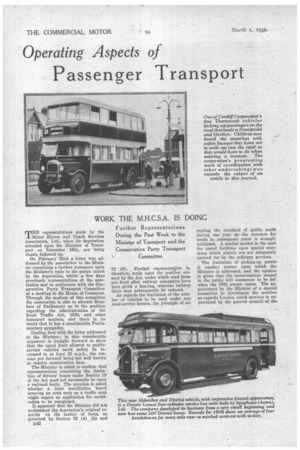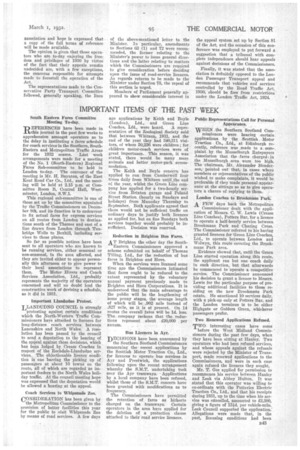Operating Aspects of
Page 60

Page 61

If you've noticed an error in this article please click here to report it so we can fix it.
Passenger Transport
WORK THE M.H.C.S.A. IS DOING
THE representations made by the Motor Hirers and Coach Services Association, Ltd., when its deputation attended upon the Minister of Transport on December 16th, are -being closely followed up.
On February 22nd a letter was addressed by the association to the Minister containing a further statement upon the Minister's reply to the points raised by the deputation, whilst a few days previously representatives of the association met in conference with the Conservative Party Transport Committee at a meeting in the House of Commons. Through the medium of this committee the association is able to educate Members of Parliament as to the position regarding the administration of the Road Traffic Act, 1930, and other transport matters, and there is no doubt that it has a considerable Parliamentary sympathy.
Dealing first with the letter addressed to the Minister ; in this considerable argument is brought forward to show that the speed limit allowed to publicservice vehicles could safely be increased to at least 35 m.p.h., the reasons put forward being too well known to require enumeration here.
The Minister is asked to confirm that representations concerning the limitation of drivers' hours under Section 19 of the Act need not necessarily be upon a national basis. The question is asked whether a joint conciliation board covering an area such as a traffic area might expect an application for certification to be recognized.
It appeared that the Minister did not understand the deputation's original remarks on the matter of fares, as governed by Section 72 (4) (b) and
u42 72 (6). Further representation is, therefore, made upon the position created by the Act, under which road fares are fixed after railway companies have been given a hearing, whereas railway fares may subsequently be reduced.
As regards the limitation of the number of vehicles to be used under any road-service licence, the principle of ac
cepting the standard of public needs during one year as the measure for needs in subsequent years is strongly criticized. A similar matter is the need for travel facilities upon special occasions which plainly are not adequately catered for by the ordinary services.
The limitation of picking-up points is another matter upon which the Minister is addressed, and the opinion is given that the inconvenience caused to the public will commence to be felt when the 1932 season opens. The appointment by the Minister of a special committee to investigate the position as regards London coach services is appreciated by the general council of the
association and hope is expressed that a copy of the full terms af reference will be made available.
The opinion is given that those operators who are to-day enjoying the freedom and privileges of 1930 by virtue of the fact that their appeals remain undecided are, with a few exceptions, the concerns responsible for attempts made to forestall the operation of the Act.
The representations made to the Conservative Party Transport Committee followed, generally speaking, the lines of the above-mentioned letter to the Minister. In particular, amendments to Sections 63 (1) and 72 were recom: mended, the former relating to the Minister's power to issue general directions and the latter relating to matters which the Commissioners are required to give consideration before deciding upon the issue of road-service licences. .M regards returns to be made to the Minister under Section 75, the repeal of this section is urged.
Members of Parliament generally appeared to show considerable interest in the appeal system set up by Section 81 of the Act, and the occasion of this conference was employed to put forward a suggestion that a tribunal with complete independence should hear appeals against decisions of the Commissioners.
Finally, it was stated that the association is definitely opposed to the London Passenger Transport appeal and recommends that vehicles and services controlled by the Road Traffic Act, 1930, should be free from restrictions under the London Traffic Act, 1924.




































































































